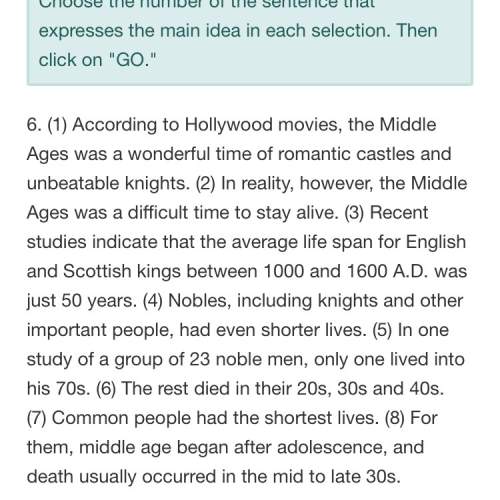
Read this excerpt from "birdfoot's grampa.” but, leathery hands full of wet brown life, knee deep in the summer roadside grass, he just smiled and said they have places to go to too. based on the excerpt, what will readers most likely infer about grampa? a he is accepting of his grandson’s ignorance. b he is irritated by his grandson’s impatience. c he believes he will not be able to save all the toads. d he believes his grandson should not talk back.

Answers: 2


Another question on English

English, 21.06.2019 22:00
When i was four years old, my dad and i a tree in our front yard. it was a tiny, fragile sapling. he promised me that it would grow tall and strong, but he said that i had to be patient. until i turned 18 years old, dad and i it every year on my birthday. choose the words that correctly fill in the blanks.
Answers: 1

English, 22.06.2019 02:50
Match the definition to the word for a better understanding of the paragraph. 1 money does not buy happiness or security. 2john ringling, one of the five brothers of the ringling brothers circus, started out in 1884 with a trained horse and a performing bear. 3for over forty years, he worked hard at the family enterprise, bought up smaller circuses, and imported new acts. 4in the 1920s, he was rated as one of the world's wealthiest men and owned every sizable circus in the country. 5over 5,000 people were on his payroll, and over 240 railroad cars were in his retinue each time the circus moved. 6at the time of his death, however, he was a nervous, unhappy man; he was also bankrupt and beset by lawsuits. 7his carefully built circus empire passed into alien hands. 8all those years of work had turned to dust. 1. business organization alien 2. group beset 3. without funds to pay debts retinue 4. troubled or harassed enterprise 5. strange; belonging to another person, place, country, or thing bankrupt
Answers: 2

English, 22.06.2019 03:40
Read this paragraph from chapter 5 of the prince. there are, for example, the spartans and the romans. the spartans held athens and thebes, establishing there an oligarchy: nevertheless they lost them. the romans, in order to hold capua, carthage, and numantia, dismantled them, and did not lose them. they wished to hold greece as the spartans held it, making it free and permitting its laws, and did not succeed. so to hold it they were compelled to dismantle many cities in the country, for in truth there is no safe way to retain them otherwise than by ruining them. and he who becomes master of a city accustomed to freedom and does not destroy it, may expect to be destroyed by it, for in rebellion it has always the watchword of liberty and its ancient privileges as a rallying point, which neither time nor benefits will ever cause it to forget. and whatever you may do or provide against, they never forget that name or their privileges unless they are disunited or dispersed, but at every chance they immediately rally to them, as pisa after the hundred years she had been held in bondage by the florentines. what idea is stressed in the passage? the desire for liberty the establishment of an oligarchy the dismantling of an acquired state the tendency toward rebellion
Answers: 1

English, 22.06.2019 08:00
In free the children why does the author provide a first-hand account of visiting a brick kiln? to emphasize how factory conditions have improvedto show a group of people wno iqbal escapeto emphasize the homic conditions of debt slaveryto show the place where iqbal was forced to work
Answers: 1
You know the right answer?
Read this excerpt from "birdfoot's grampa.” but, leathery hands full of wet brown life, knee deep in...
Questions


English, 04.10.2020 17:01









Mathematics, 04.10.2020 17:01









Mathematics, 04.10.2020 17:01




